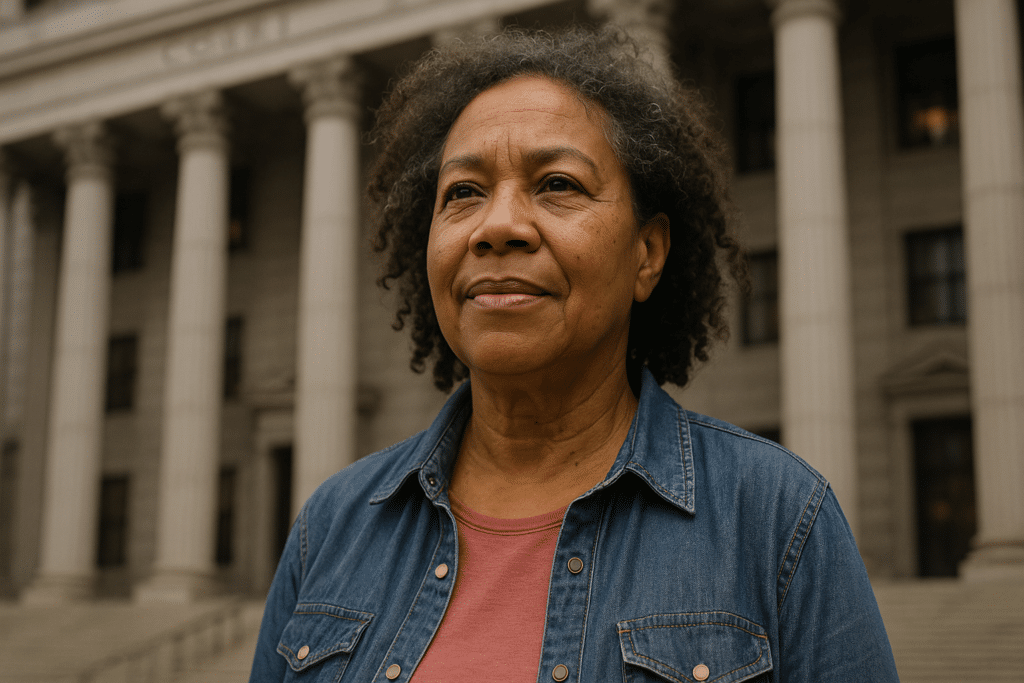In the United States, millions of people go to civil court each year—facing foreclosure, debt collection, eviction, custody battles, and more—without a lawyer. Not because they choose to, but because they can’t afford one. Civil courtrooms have become places where rights are decided without representation, where outcomes are driven by power, not law.
This isn’t a legal problem—it’s a democratic one.
When ordinary people can’t access the justice system, they lose faith in government. When courts become weapons for banks, landlords, and insurers, the rule of law collapses into the rule of money. And when people believe the courts are closed to them, they stop participating in democracy altogether.
The Judiciary Is Where Individuals Meet the State
We often talk about the three branches of government—executive, legislative, and judicial—as co-equal arms of a functioning democracy. But only one of them is designed to speak directly to the individual, not the collective.
- The executive branch governs the population, enforcing laws and maintaining order at scale.
- The legislative branch writes laws to benefit the majority or the most influential.
- But the judicial branch? It hears one case at a time. It listens to the facts of your story. It renders judgment based on your circumstances.
That’s why courts are so powerful—and why denying access to them is so dangerous. If the judiciary is the only place a single person can hold the system accountable, then that person must have the tools to stand and be heard.
Pro Se Litigants Are Democracy’s First Responders
Pro se litigants stand up in court—unarmed, untrained, often afraid—and demand their rights. They are:
- Civic actors, insisting on due process.
- Educators, learning the law and sharing it.
- Watchdogs, calling out bias and incompetence in real time.
- Rebuilders, forcing the courts to serve the people they were made for.
They do this not in theory, but in thousands of courtrooms across the country, every single day.
Supporting them isn’t charity—it’s infrastructure. Every person who can navigate the legal system without a lawyer makes democracy more durable. They make our institutions work as intended.
How Pro Se Litigants Rebuild Democracy
- They Reclaim Power
They prove that the law belongs to the people—not just lawyers. - They Expose Systemic Injustice
Because they lack political insulation, they surface where the system fails most often: with poor people, disabled people, minorities, immigrants, and women. - They Increase Accountability
Judges, clerks, and opposing lawyers can’t hide behind legal jargon when a layperson is in the room. - They Inspire Collective Action
When one person wins without a lawyer, others follow. Communities learn their rights. Movements grow. - They Rebalance the Scales
In a country where 90% of opposing parties (banks, corporations, landlords) have attorneys, pro se litigants force the courts to serve both sides of the “justice for all” promise.
Courtroom5 Makes Better Pro Se Litigants
At Courtroom5, we give everyday people the tools lawyers use—document templates, procedural guides, legal research, strategic coaching, and a growing community of support. We don’t just help people survive their court cases. We help them build a personal practice of law, a repeatable process for navigating the courts with confidence and skill.
Our platform turns fear into knowledge, confusion into clarity, and helplessness into agency.
The Founders’ Journey
Courtroom5 was founded by two women who, like millions of others, had no choice but to represent ourselves in court. What started as desperation turned into determination. We studied the rules. We made mistakes. We kept showing up. And we started to win.
That sense of victory—the realization that you can fight and win in court—was life-changing. It brought a deeper sense of citizenship, a feeling that we belonged in the institutions of American democracy. That’s the feeling we want every Courtroom5 user to have.
The Call to Action
If we want to rebuild American democracy, we must make the courts accessible to everyone—not just through representation, but through self-representation.
That means tools, training, community, and dignity. It means shifting our mindset from “you need a lawyer” to “you can do this—with the right support.”
It means building platforms like Courtroom5, where people can run their cases the way lawyers do—confidently, competently, and in service of justice.
Democracy doesn’t die in courtrooms—it’s reborn there. One pro se litigant at a time.



